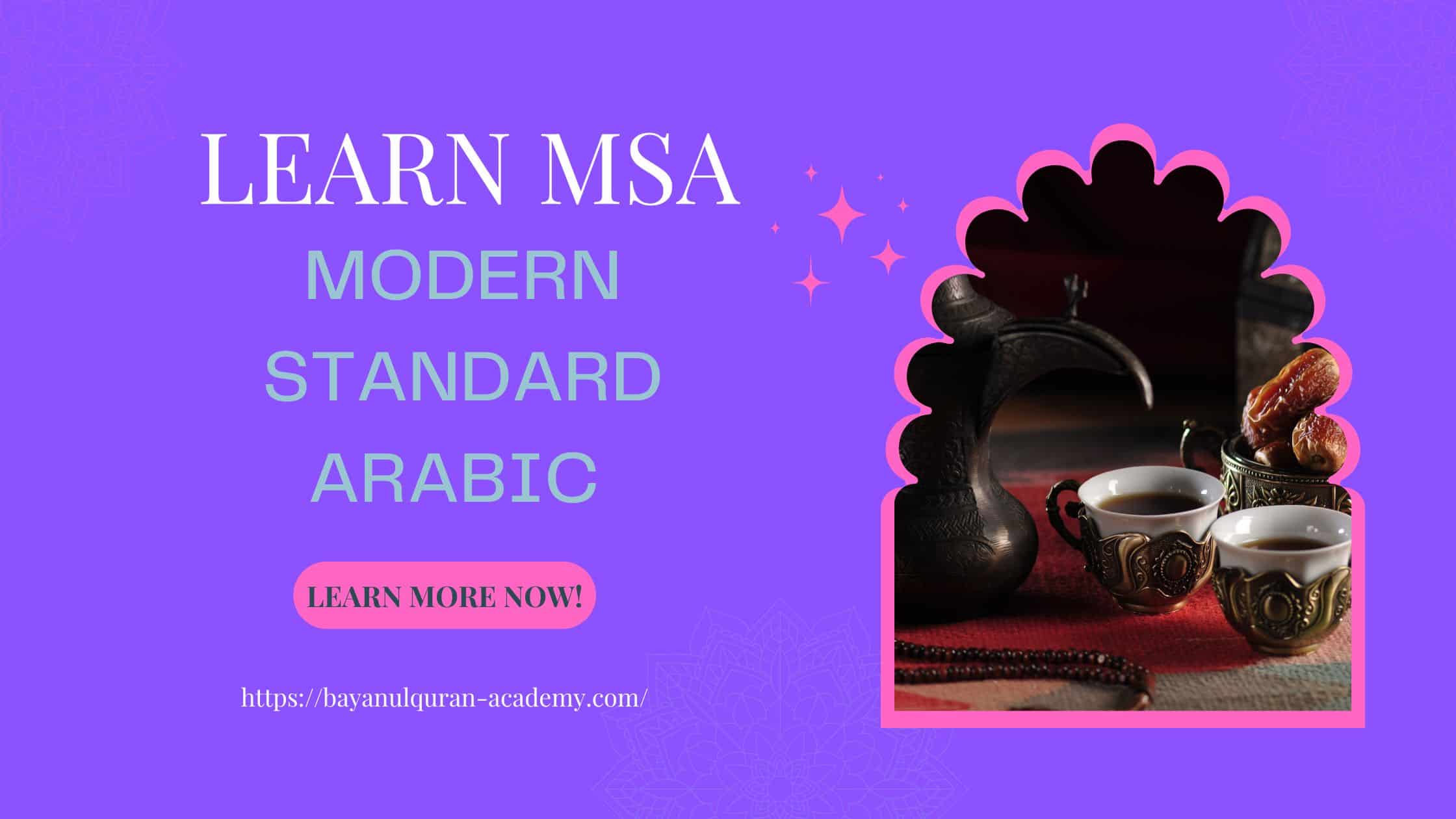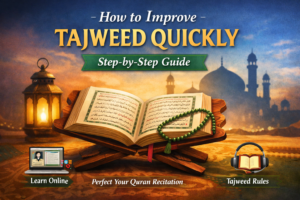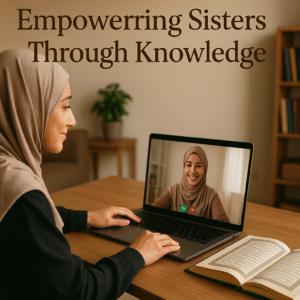Modern Standard Arabic (MSA) is one of the most widespread forms that non-Arabs learn, who are interested in learning the Arabic language. They are eager to be proficient in MSA due to several reasons.
For instance, some of them need to visit Arab countries, so they will be able to communicate with Arabs. Additionally, most non-Arabic Muslims look forward to fluency in Arabic as they can learn Quran and Islamic studies.
Undoubtedly, Arabic is one of the most profound, living languages on earth, since mankind’s creation, and till its Last Day. Over the ages, the Arabic language has firmly stood all the time challenges, whereas other languages faded away.
Arabic has several linguistic styles, and takes different, meaningful shapes, according to the changing context, purpose, usage, people, time, etc. In the following lines, let’s have a closer look at the modern standard Arabic (MSA) used nowadays.
It’s worth mentioning that Arabic has mainly two forms besides MSA: Classical Arabic, the formal type that you find in the Quran, and Colloquial Arabic, which is the informal dialect Arab people speak all over the Middle East.
If you’re among English speakers who desire to learn Modern Standard Arabic, you can find all the details you need about it before you get started in this article.
Table of Contents
What is Modern Standard Arabic?
Modern Standard Arabic (MSA) simply refers to the academic style of Arabic used in formal contexts, whether spoken or written- like in media, education, and religion- across the Arab world.
Of course, each Arab country has a specific dialect- and some of them may seem even irrelevant to the standard Arabic; yet the modern standard Arabic serves as the united, comprehendible Arabic form to use across all the Arab regions, and that is why it is called ‘standard’.
It is also called ‘Modern’ as this formal style of Arabic used globally nowadays is a fitting mixture resulting from combining the fundamentals of the solemn Arabic- “Fusha”, over the centuries, with the developed, present, linguistic needs, expressions, and structures, etc. So, modern standard Arabic holds on its linguistic, unique heritage, while coping with the present, modern linguistic usage.
MSA is the formal and modern type of Arabic language. Its roots go back to the Classical form or Pre-Modern that old Arabs used in the 7th century.
Modern Standard Arabic is also known as Literary Arabic. Arabs named it “Al-Fusha”. It’s the main form that Arab students learn at schools. Moreover, it’s the popular type that is written in newspapers, books, and magazines and is spoken in broadcasting news on both Radio stations and TV.
Arabs lean on MSA as a formal language version as it is simpler than Classical Arabic. It is suitable for their contemporary lives, unlike the Pre-Modern form that contains complicated words that need interpretation.
Is Modern Standard Arabic Useful?
Yes, undoubtedly, modern standard Arabic is useful to learn for a number of reasons; as it helps to learn the correct grammar of Arabic. MSA learners can understand official documents such as books, blogs, and the news. Academics, who are interested in studying the Arab region and Arabic history and heritage can read and take advantage of studies about these topics. Through learning MSA, learners can understand Arab culture.
the three, most crucial, evident reasons of learning MSA are:
1. Formality:
Modern Standard Arabic is the formal Arabic used in all official contexts, on the national and international level of the Arab countries, whether news, education, media, etc.
2. Unity and Consistency:
In spite of the various Arabic dialects of the various Arab countries, modern standard Arabic can still be unifying, and consistent enough to be the common ground of all the Arab countries, no matter their colloquial variations.
3. Stable Reference of Both, Past and Present:
Modern standard Arabic, also known as Fusha, is the academic, recorded form of Arabic to grasp all the Arabic heritage of knowledge, besides coping with the present developments and communications.
Is Modern Standard Arabic the Same As Fusha?
To Arabs, yes it is; modern standard Arabic is interchangeable with ‘Fusha’; they can be considered originally the same, as the linguistic similarities between them is way more than their slight difference. They, both, have common vocabulary, meanings, and structure.
Yet, Fusha is more neat and rhetoric, whereas modern standard Arabic may include ‘more-modern’, practical terms, like that of the inventions, and Arabized, nowadays-expressions, and so on. So, in essence, they are the same.
Is Modern Standard Arabic Spoken? Where?
Of course, it is! As previously said, modern standard Arabic is not only used in the official documents or writings, but also it is the formal spoken Arabic used in communications across the Arab world, whether nationally or internationally, in, media, education, religion, and so on. Actually, modern standard Arabic is the sixth official language of the United States.
All the educated people in the whole Arab World- no matter what particular country they are from- can fluently speak, communicate, and understand the modern standard Arabic, as it is part and parcel of their culture, education, and regular, formal communication.
Yes, every Arab country has its own dialect of Arabic, yet they are all aware of the modern standard Arabic as a solid, common ground of understandable communication with the other Arabs, and also with the non-Arabs learning it.
The Arabic Eastern Dialects vs. Modern Standard Arabic:
Yes, modern standard Arabic is the formal language of the Arabs; yet, each Arab country has its special, local dialect of Arabic. Every Arab country’s people have their own way of pronouncing, and using the Arabic language, through their distinguished colloquial, expressive style and proverbs, based on their own history, culture, and linguistic development with others, as non-Arabs.
Therefore, true is that learning the modern standard Arabic helps you to communicate ‘formally’ with the Arab people, as they already know it. However, that doesn’t necessarily guarantee you understanding their specific dialect of their country, nor their colloquial proverbs and expressions they use in their daily, informal talks.
So, it is up to you to decide which to learn first, whether modern standard Arabic, or a specific Arabic dialect, according to your learning-target, whether it is an academic study, or visiting an Arab country!
Actually there are many Arabic dialects, but the most famous ones are:
- The Egyptian Arabic Dialect:
So famous, and spread by the Egyptians over the world, thanks to their wide-spread media.
- The Iraqi Arabic Dialect:
Spoken in Iraq, and Known mainly for its intense accent, and its loanwords from Turkish, and Kurdish.
- Gulf Arabic Dialect:
Spoken across the Persian Gulf, like Bahrain, Kuwait, Saudi Arabia, and Emirates, and known for its loanwords from Hindi, and Persian.
- Levantine Arabic Dialect:
Spoken across the Levant countries: Syria, Palestine, Lebanon, and Jordan, and known for its loanwords from Turkish, and French.
- Maghreb Arabic Dialect:
Spoken in North African countries, like Morocco, Algeria, Libya, and Tunisia, and known for its loanwords from French, and Berber.
Difference Between Modern Standard Arabic and Dialects
The main difference between MSA and local dialects is outlined in the following differences:
Modern Standard Arabic
- Modern Standard Arabic is the form that All Arab countries use in formal writing and speaking among Arabs. It’s the Academic form of language.
- According to the United Nations, Modern Standard Arabic is one of its official languages.
- MSA is the primary source of learning Arabic grammar structure and the guide to reading and comprehending formal texts.
Arabic Dialects
- Local dialects vary from one Arab country to another. Arabs use them in their daily conversations, whether in speaking or writing.
- Learning local dialects helps non-native Arabs communicate in the same slang that people speak in their country. For instance, if you’re proficient in the Egyptian-Arabic dialect, you can communicate with Egyptians when you travel to Egypt.
Modern Standard Arabic vs Classical Arabic
Even though Modern Standard and Classical Arabic are both formal forms of language there are a few differences between them:
- Modern Standard Arabic is commonly used in Media, but Classical Arabic is the form of the old literature.
- If you want to learn how to perfect in linguistic skills, MSA is the recommended version. On the other side, Classical Arabic fits those who desire to understand Quran and prophetic narrations.
- MSA is simpler than Classic Arabic as it contains contemporary words that are easy to understand.
- MSA has many linguistic borrowings from Europe countries, unlike Classical Arabic.
- In MSA texts, you’ll find that diacritics aren’t common in contrast to Classical Arabic.
Modern Standard Arabic vs. Egyptian Arabic:
As for talking about modern standard Arabic, and its formality vs. the regional, Arabic dialects, let’s pick the Egyptian dialect as it’s the most famous one:
Egyptian Arabic simply refers to the Egyptian dialect of the Arabic language; Egyptian Arabic can be surely considered as the most famous, colloquial dialect of Arabic, among the other regional dialects.
That is thanks to the sweeping popularity of the highly-sociable Egyptians, and their known, spreading media that transcends beyond Egypt’s borders into the rest of the Arab countries, and even the non-Arabs, sometimes!
So, despite the variations of their Arabic dialects, the Arabs mostly still get the gist of the Egyptian dialect, and enjoy its tasteful culture, and catchy expressions!
What to Choose to Learn, Then?
Egyptian Arabic is highly recommended for you to learn, if your target is to go to Egypt for some reason, like living for a while or starting a business, as it is the dialect the people there use in their daily-life situations, and to enjoy their friendly, informal communications, out of the academic contexts. Egyptian dialect reflects their unique taste of life.
Whereas, modern standard Arabic is the best to choose when you go ‘formal’, like if your target is mainly academic, like studying, or getting quite knowing of the Arabic culture, literature, or even the religious studies, like learning Islam, and the Holy Qur’an; the Arabic knowledge and education is mainly in Fusha.
What Countries Speak Modern Standard Arabic?
Modern Standard Arabic is the official language in the following countries:
- United Arab Emirates.
- Oman.
- Egypt.
- Yemen.
- Sudan.
- Palestine.
- Qatar.
- Bahrain.
- Lebanon.
- Jordan.
- Iraqi.
- Morocco.
- Libya.
- Syria.
- Tunisia.
- Kuwait.
- Chad.
- Saudi Arabia.
- Algeria.
- Djibouti.
- Somalia.
- Mauritania.
Should I learn Modern Standard Arabic or Egyptian Arabic?
Some non-Arabs tend to start learning Arabic by identifying the Egyptian dialect as it’s the simplest form of the Arabic language.
However, it’s recommended to begin with Modern Standard Arabic as you can learn the official form of All Arab countries.
Furthermore, you’ll be acquainted with Arabic basics, so you can form a sentence with proper grammar, access Arab affairs, and discuss different topics with native speakers.
When it comes to learning Egyptian dialects, you can’t understand Arabic literature if you’re interested in accessing poems and find out that you use words that don’t exist in the original language.
Moreover, Egyptian dialects will be useless for you if you want to read Quran or any other book, and you won’t understand the Arabic news.
While reading or even hearing official Arabic, you’ll find many words that seem complex to you, and you’ll spend much time searching for their meanings.
Is Qur’an Written in the Modern Standard Arabic?
Pay close attention to this answer:
Qur’an is written in the 6th century A.D., in the medieval dialects of Arabic, at that time; its language is called ‘the Quranic Arabic’, or ‘Classical Arabic’, which is close, on the basics-level, to the modern standard Arabic nowadays; Arabs generally use those two forms of Arabic interchangeably. Both have much in common.
Still, there are minor differences between the Quranic Arabic, and the modern standard Arabic, like those regarding the Qur’anic vocabulary, and context; the Qur’an Arabic is more profound, elevated, literary-like style, as in the classical literature, with a deeper, neatly-structured, eloquent context, as it is derived from the Divine Book, Qur’an.
Whereas, the modern standard Arabic includes the new, invented words in the present days, that may not exist in the Qur’anic Arabic. Also, its context can be widely spoken or written, and less rhetoric, and complex, than that of the Holy Qur’an.
However, both forms are quite similar; whoever learns modern standard Arabic can quickly learn the Qur’anic Arabic, and vice versa, as the basics in common are way more than their slight differences of style and form.
Is Modern Standard Arabic Easy to Learn?
After you’ve found out that you should learn Modern Standard Arabic, you inevitably need to know if it’s easy or complicated. In reality, you’ll find challenges when you start to acknowledge the basics. That’s the same happens when you learn any new language.
MSA is not easy to learn as you’re accessing the official language that is the guide to the fundamentals of Arabic.
Modern Standard Arabic has a different style of English. You write the letters from right to left, and they are mostly aren’t separated.
The pronunciation is totally different from any language. Grammar has many rules that require constant practicing and studying such as diacritics.
However, It’s not complicated to be proficient in all linguistic skills in Arabic. The learning process relies on your patience, effort, and regular time for learning.
The whole journey depends on the goal you aim for and how much you’re passionate about Arabic.
How long does it take to learn modern standard Arabic?
Learning a foreign language takes a lot of time which varies from one learner to another according to the period of studying.
The Foreign Service Institute indicated that learning Arabic takes nearly 2200 hours.
This estimated period is enough for English learners to reach an advanced level in Arabic. You can spend 700 hours learning if you need to be familiar with the basics.
How to Learn Modern Standard Arabic?
The most important question that you need to get its answer is the best way to learn Modern Standard Arabic.
The easiest method is to join a professional course and learn with highly-qualified tutors to follow a guide that helps you reach your goal.
You can achieve it online through Bayan Al Quran Fusha Arabic course which is suitable for both beginners and advanced learners.
This course will teach the best methods of mastering MSA to learn efficiently and get hands-on experience as you’ll practice speaking with native speakers.
Moreover, you won’t have to pay fees for the first session as you’ll get a free trial after registering.
How to Learn Modern Standard Arabic?
Recognizing the great significance of modern standard Arabic as a needed common ground of all Arabic knowledge, and communication, it becomes urgent to learn it in an effective, sure way. Here are some steps to take in this learning way:
1. Join a Trusted, Arabic-Learning Academy:
Nowadays, modern standard Arabic courses are available online to millions of Arabic learners! It is all about picking a trusted one, like Bayan Academy, where you can be in the good hands of its Arabic-native, professional tutors. They are always ready to help you out, with a comprehensive learning-plan, from scratch till proficiency!
2. Start Dedicate a Daily Time:
Immersion is what accelerates your language-learning progress. Commit yourself daily to read one page, or listen to a video in modern standard Arabic to get familiar with it.
3. Practice What You Learn:
Write down, and read loudly the daily page of Arabic you are committed to, or talk in Arabic about the lesson-video you have just watched. Practice your mind and tongue to speak in Arabic.
4. Join an Arabic-Native Group:
Communicating with Arabs will always push your Arabic skills forward, as it puts your learning in action. Also, that encourages you to enjoy the fun-part of the Arabic language, away from the academic-stress.
5. Get Yourself Corrected and Evaluated:
Study, practice, and be ready to get corrected, whether from an Arabic-learning app, your Arabic-teacher, or your Arabic friend! That will train your mind to know more, and make less mistakes in Arabic.
6. Learn Arabic Online With Bayan al-Quran Native Arab Tutors:
Embark on a transformative journey of Arabic learning with Bayan Al-Quran’s comprehensive online courses. Our platform offers an authentic and immersive experience tailored to learners worldwide. Whether you’re a beginner or seeking to enhance your skills, our Tajweed courses provide expert guidance and structured learning to master Arabic learning.
🎓 Expert Guidance:
Benefit from experienced instructors who specialize in Arabic, breaking down complex rules into manageable segments for learners of all levels.
✨ Key Features:
- Structured, step-by-step learning approach.
- Access to high-quality instructional materials.
- Real-time feedback from qualified tutors to enhance your practice.
- Flexible learning schedules to accommodate your pace and convenience.
- Immerse yourself in the melodious tones of Quranic recitation, enriching your spiritual experience.
🌟 Why Choose Bayan Al-Quran?
Join our vibrant community dedicated to perfecting Arabic learning. Choose Bayan Al-Quran for a transformative learning experience and embark on a path to mastering Arabic with confidence.
Learn with Bayan al-Quran with Native Arab tutors. There are also several courses that can help you in this regard.
Conclusion
Without a doubt, learning modern standard Arabic becomes an urgent need for more learners, nowadays, as it is the language of the Arab world and even the sixth in the United States! Let’s help you achieve that better and faster, with Bayan Academy!
Modern Standard Arabic is the contemporary form that All Arab countries use in formal writing and speaking. It’s derived from Classical or Quranic Arabic and suitable for those who desire to learn how to write and read with grammar-based language.
MSA is not local like Egyptian, Gulf, and Levantine dialects, which Arabs use in daily conversations.
It requires much time to master its skills as it represents the official version. You can learn it through online courses with the best-certified tutors like Bayan Al Quran.

















